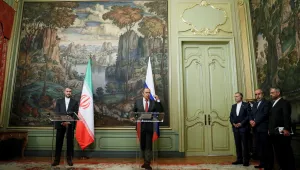Sen. Ben Cardin (D, Maryland), the ranking Democrat on the Senate Foreign Relations Committee who opposed the nuclear deal reached with Iran, has drafted new legislation to expand Congressional oversight of the deal’s implementation and its power to impose new sanctions. Cardin foreshadowed the legislation in a September 3 op-ed in The Washington Post, and a “discussion draft” of the 33-page bill – called the “Iran Policy Oversight Act of 2015” – was published last week.
The bill appears to have two goals: to clarify the American interpretation of the Joint Comprehensive Plan of Action (JCPOA), specifically regarding the passage of new sanctions; and to encode a greater Congressional role in monitoring implementation of the agreement and in punishing acts of terrorism.
Key components of the bill are broken down below. Cardin has not formally introduced the bill to the Senate Foreign Relations Committee, and so far the White House has not indicated its position. The Iranians have not responded specifically to the bill, though Supreme Leader Ayatollah Ali Khamenei stated earlier this month that some in Congress are “busy hatching plots against Iran” in an effort to “bother and create obstacles for the Islamic Republic.”
Expedited consideration of terrorism sanctions
The core of the bill allows Congress to quickly impose terrorism-related sanctions against Iran. Specifically, the President is required to notify Congress “immediately” if Iran either (a) “has directed or conducted an act of international terrorism against the United States” or (b) “has substantially increased its operational or financial support for a terrorist organization that threatens the interests or allies of the United States.”
If the President makes this determination, Congress can begin an expedited process to consider sanctions legislation targeting those who commit or support acts of terrorism. Notably, the Cardin language only pertains to expedited consideration of terrorism sanctions, not those pertaining to nuclear proliferation or other concerns.
The inclusion of this section reflects a longstanding desire of many in the Senate Foreign Relations Committee to ensure Congress can quickly respond to an act of terrorism sponsored by Iran. The original version of the Iran Nuclear Agreement Review Act, for instance, required that the President certify, every 90 days, that “Iran has not directly supported or carried out an act of terrorism against the United States.” If the President could not make that certification, Congress could consider, on an expedited schedule, legislation to reinstate all sanctions against Iran. The White House vigorously opposed this section, which it deemed a poison pill, and it was removedbefore the bill was signed into law.
Highly Enriched Uranium language
The bill states that Iranian production of highly enriched uranium (HEU) that is “non-peaceful” or inconsistent with “peaceful civilian applications” would be unacceptable. HEU generally refers to uranium that is enriched to 90% U-235, readily usable in a nuclear weapon. According to the JCPOA, after 15 years Iran is not prohibited from producing this material.
In a “Statement of Policy on Deterrence,” the bill states:
“Iran does not have an inherent right to uranium enrichment and is not permitted to accumulate highly enriched uranium, pursuant to its enduring international obligations, beyond what is consistent with peaceful civilian applications, and as such it is the policy of the United States that all of the options available to the United States, including the military option, remain available to prevent Iran from achieving a nuclear weapons capability.”
This language mirrors suggestions by Dennis Ross, David Makovsky, and David Petraeus, to publicly declare that HEU production is an American “red line.” In a Politico op-ed, Ross and Makovsky write:
“…since there is no civilian justification for producing highly enriched uranium (HEU), there should be no reason why the White House cannot accept legislative language that would treat the production of HEU as a trigger for the possible use of force.”
Bob Einhorn has made a similar suggestion about production of HEU and separated plutonium, but believes this red line should be communicated privately.
Aid to Israel
The bill authorizes the President to provide security assistance to Israel necessary to “address Iranian nuclear facilities” including “applicable ordnance and delivery systems, to counter non-peaceful nuclear activities by Iran, such as the production of highly enriched uranium for non-peaceful purposes.”
However, unlike an earlier draft, the bill does not specifically discuss providing the Massive Ordnance Penetrator, a 30,000 pound bunker-buster bomb, to Israel.
It also authorizes the President to provide additional foreign military funding to Israel over the next 10 years “as may be needed to address threats from Iran.” In particular, the bill also requires that the President provide, “as appropriate,” weaponry and cooperation to both “ensure Israel’s qualitative military edge and effectively deter conventional and nuclear threats support, directly or indirectly, by Iran.”
Maintaining missile, terrorism, and human rights sanctions
The bill also seeks to clarify Congressional authority to impose non-nuclear sanctions against Iran.
According to the JCPOA, all nuclear-related sanctions imposed by the United Nations, United States, and European Union are to be lifted on a specified time table. In general, non-nuclear sanctions related to Iran’s sponsorship of terrorism, proliferation of missile technology, and abuse of human rights remain in place. Iran has consistently expressed concern that the United States will simply re-classify nuclear sanctions as non-nuclear sanctions, meaning Iran would receive limited sanctions relief. Addressing that concern, the JCPOA reads that Iran considers such an action “as grounds to cease performing its commitments under this JCPOA in whole or in part.”
But some in Congress have expressed concern that the U.S. government will be skittish in imposing non-nuclear sanctions. Therefore, the bill reaffirms that “nothing in the JCPOA limits or curtails the ability of Congress to pass sanctions legislation to address” terrorism, missile activities, and human rights.
It also prohibits the President from de-designating individuals or entities from various sanctions lists without providing a formal certification to Congress.
Additional provisions
The bill addresses the need for increased funding to two agencies that will face increased workloads under the JCPOA: the International Atomic Energy Agency (IAEA), and the U.S. Treasury Department’s Office of Foreign Assets Control (OFAC). For the IAEA, the bill authorizes an increase in the U.S. portion of funding allocated to the IAEA over the next 10 years to ensure IAEA can “fulfill its verification responsibilities under the JCPOA.” For OFAC, the bill expresses the “Sense of Congress” that OFAC “should be fully funded to ensure strict enforcement of sanctions.”
The bill also requires the President to report how the IAEA resolved its investigation of the Possible Military Dimensions (PMD) of Iran’s nuclear program, including “methods and results of environmental sampling at the Parchin military base.”
As noted above, the full text of the bill, with additional provisions and reporting requirements detailed, can be found here.
Rome, Henry. “Assessing the Iran Policy Oversight Act of 2015 (Cardin bill).” September 29, 2015





